- Home
- News & Features
- News
- FY2019
- “A Society That Leaves No One Behind”: 25 Years After the Rwandan Genocide, Nation Seeks Social Diversity Through Skills Training for Ex-Combatants and Others with Disabilities
News
June 6, 2019
“A Society That Leaves No One Behind”: 25 Years After the Rwandan Genocide, Nation Seeks Social Diversity Through Skills Training for Ex-Combatants and Others with Disabilities
This is the 25th year since genocide in Rwanda is thought to have killed anywhere from 500,000 to a million people. As support for ex-combatants and others with disabilities was quite limited, JICA undertook a program of skills training and job obtainment assistance for such individuals, following up by monitoring the living conditions of those who received such support in a comprehensive, long-term initiative aimed at reinforcing the country’s efforts to build peace and reconstitute a resilient society in which conflict cannot happen again.
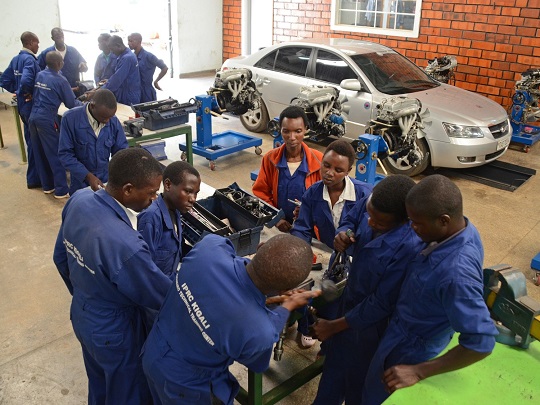 Former combatants with disabilities receiving skills training in automotive maintenance
Former combatants with disabilities receiving skills training in automotive maintenance
Former enemies and people with disabilities are both supported with skills training
The long years of ethnic conflict and genocide that took place in 1994 wrought harm on both combatants and the general population, leaving many with disabilities. Although the Rwandan government has proactively supported the reintegration of ex-combatants into society, those with disabilities fell through the net, leaving them isolated from society and in sore economic straits.
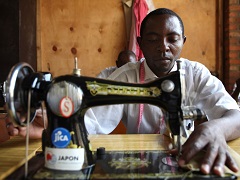 Ex-combatant learning sewing skills
Ex-combatant learning sewing skills
In response, in cooperation with the Rwanda Demobilisation and Reintegration Commission (RDRC) and local skills training centers, in 2005 JICA undertook Skills Training for the Reintegration of Demobilised Soldiers with Disabilities, a project to facilitate economic and social independence of disabled ex-combatants by providing skills training courses such as welding, electric wiring, sewing and so on.
With the Rwandan government extending support equally to ex-combatants without regard to their affiliation during the conflict, this project targeted individuals regardless of whether they fought for the government or for the opposition. Assistance provided to former combatants helps them reintegrate into society, and the resulting stable lives will help prevent future conflict.
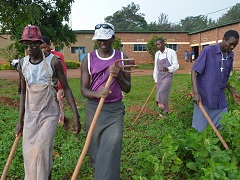 Agricultural training for ex-combatants with disabilities and disabled people from the general population
Agricultural training for ex-combatants with disabilities and disabled people from the general population
From 2011, support was extended to non-combatants through The Skills Training and Job Obtainment Support for Social Participation of the Ex-Combatants and Other People with Disabilities project. Many disabled people in the general population were socially isolated, and support remained out of reach for such people.
Training people of different situations in the same class made it possible for disabled people from the general population to receive encouragement from ex-combatants. This helped them to develop confidence in their ability to achieve independence in spite of their disabilities, promoting significant personal growth and changing them from people who require support into individuals who are capable of contributing to society. After receiving skills training, ex-combatants and people of the general population have begun working together, transcending their different situations in a process of give and take.
This transforms members of vulnerable groups, such as the disabled and combatants on the losing side of the conflict, into capable members of society, contributing to achievement of national peace.
Ex-post monitoring on living conditions of beneficiaries after project completion
Eri Komukai, a JICA Senior Advisor, who has been involved with the projects from the start, says “Even though the project may appear successful at the time of its completion, true success depends on its contribution to achieving a lasting peace. Periodic visits to beneficiaries’ homes help us more fully grasp the true effectiveness of the project.”
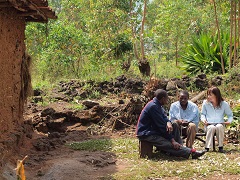 Senior Advisor Komukai (right) talks with a visually-impaired person who received skills training
Senior Advisor Komukai (right) talks with a visually-impaired person who received skills training
Over the five years since the 2014 conclusion of the project, Senior Advisor Komukai and her associates have paid annual visits to beneficiaries of skills training to check their living conditions and other circumstances. They saw many examples of people who have achieved higher standards of living through skills learned during training courses, such as a man who, after losing his arm during the conflict, took advantage of his education as a tailor to open his own tailor shop. His business has been successful, and he has relocated to a site that is located on a main road.
Other trainees told Komukai things like, “Before, I could not leave the house, but training changed my world by helping me get out into the world,” and “Thanks to JICA’s training, I have more income, more friends, and a new life.” She also heard “I was so happy to have someone from JICA come visit me after my training was over, and I hope you’ll come again.”
On the other hand, words such as “I still have nightmares from the days of fighting” impressed upon Komukai the extent of the trauma inflicted upon the people of Rwanda by the ferocious conflict. Regarding the RDRC’s leveraging of know-how developed through JICA’s project for ongoing support to disabled ex-combatants, Komukai says “I’ll be happy if JICA’s cooperation has helped vulnerable groups receive assistance in the wake of the conflict.”
Rwanda’s Initiative: “The Miracle of Africa”
This February, Rwanda hosted a peace-building seminar in Kigali, its capital city, to share its experience with the disability support project and subsequent monitoring. Participants from Somalia, Sudan, South Sudan and Nigera, all countries afflicted by internal conflicts, unanimously hailed the results of Rwanda’s initiative as “a true miracle.”
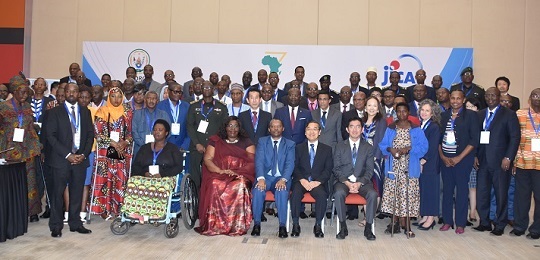 Participants at the Rwanda Peace-building Seminar held in Kigali this February
Participants at the Rwanda Peace-building Seminar held in Kigali this February
Attending the seminar, Mr. Abdalla Mahmoud Zainelabdin, Director for Planning and Coordination of the Sudan DDR Commission, said “The countries of Africa can learn something from each other about peace building, and it is important that we share our efforts through seminars like this one.”
Also, the ambassador to Rwanda from Egypt, whose president is serving as Chairperson of the African Union in 2019, said that he hoped occasions such as the 7th Tokyo International Conference on African Development (TICAD7) being held in Yokohama this coming August would serve as opportunities for Egypt to work together with Japan in leading efforts to promote peace building in Africa.
The inclusive support extended to the disabled in Rwanda can be regarded as an example of the sort of effort needed to achieve a “society where no one is left behind,” which is both one of the Sustainable Development Goals (SDGs) and a human security objective. Rwanda is overcoming the negative legacy of genocide that took place 25 years ago, and now setting its eyes on realization of a diverse society that embraces the socially vulnerable. JICA will build on the results of the Rwanda project at TICAD7 and work to spread its benefits to other countries.
- About JICA
- News & Features
- Countries & Regions
- Our Work
- Thematic Issues
- Types of Assistance
- Partnerships with Other Development Partners
- Climate Change / Environmental and Social Considerations
- Evaluations
- Compliance and Anti-corruption
- Science and Technology Cooperation on Global Issues
- Research
- JICA Development Studies Program / JICA Chair
- Support for the Acceptance of Foreign HRs / Multicultural and Inclusive Community
- Publications
- Investor Relations





